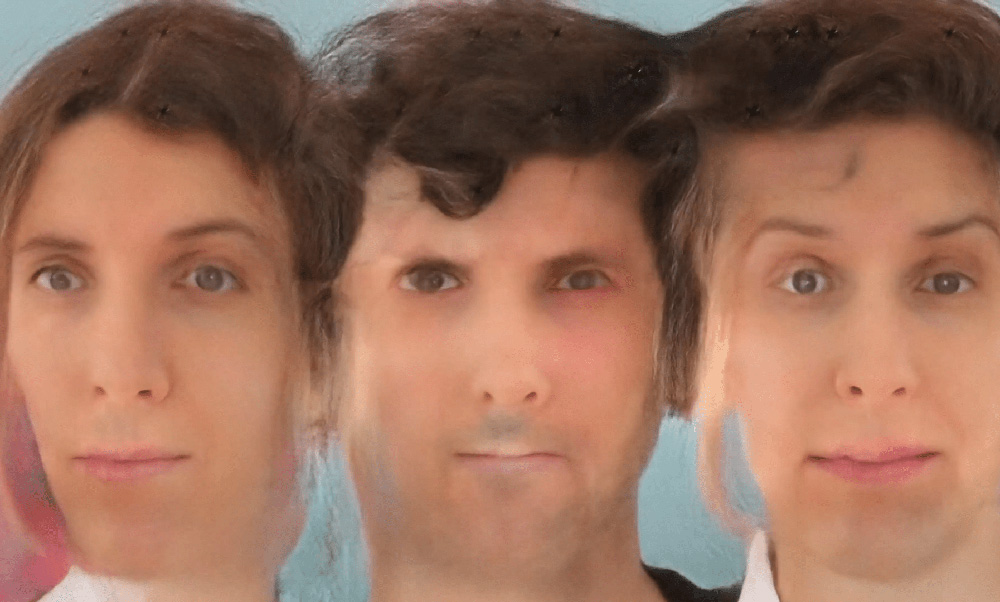“If you think of AI as a sum total of human intelligence [up until now], it’s a different thing,” K Allado-McDowell, a leader at Google’s Artists and Machine Learning program tells the members of the band Yacht in “The Computer Accent,” describing a computer’s capabilities to create music. The pop trio of Jona Bechtolt, Claire L. Evans and Rob Kieswetter (also known by his stage name Bobby Birdman) aren’t there to be convinced, already having decided that the most creative challenge they could pose to themselves at this stage in their career is to surrender themselves completely to the whims of an algorithm for their seventh studio album, uploading all the information needed by a computer from their own back catalog to musical influences to predict what a new song would sound like based on the past. However, they do begin to look at what their own abilities are versus that of a machine in a little bit different light in Sebastian Pardo and Riel Roch-Decter’s fun and frequently fascinating look at whether AI is currently capable of making great art.
At the very least, “The Computer Accent” proves that it can inspire it when Pardo and Roch-Decter join Yacht for the three-year journey to create “Chain Tripping,” an album that’s title like nearly every aspect of it was AI-generated. Although Yacht’s brand of dance music has always been reliant on computers, the future-forward group wonders what technology could do without them now that artificial intelligence has matured and there is a slight inference by way of juxtaposition that their faith in their own judgment may be at a nadir after an attempt at viral marketing for their previous album with a faux sex tape leak backfired spectacularly in 2016.
There’s a refreshing lack of cynicism around their effort to try something new. (Save for Eric Isaacson, the owner of the L.A. vinyl shop Mississippi Records who gets a showstopping scene, worrying that looking for answers from technology is a first step towards fascism.) But the band encounters resistance from the technology itself during a process Bercholt comes to describe as both “reassuring and frustrating” when it involves far more human participation and decision-making than they could have ever anticipated, being required to upload 10,000 pages of lyrics of their choosing as a source of data to be mined by the algorithm and fiddling around with “temperature,” which allows the questions to be asked of the algorithm to be more experimental or conservative leading to more diverse or familiar fare.
After setting out clear rules for themselves to abide by to keep the project as pure as possible, Evans starts to wonder if they can give themselves a cheat when issues are less creative than logistical, yet it gives Pardo and Roch-Decter the opportunity to show their own ingenuity in conveying this human-technological collaboration, often showing studio time with the band in letterbox as they’re trying to squeeze out solutions inside the confines they’ve created for themselves and in one particularly memorable sequence, use the audio of the band members waffling over how much work it’s going to take to convert their entire past musical output into MIDI files as their decisions are reflected on a computer screen where every action is precise and free of such apparent scrutiny.
The co-directors are also wise to save the bulk of any biographical context for Bechtolt, Evans and Kieswetter until they’re well into the creative process on “Chain Tripping,” allowing their insights into what specific qualities and experience they bring to making music together to illuminate what connections they’ve made to each other uniquely human while they try to get a similar synchronicity going with the computer. Although Kieswetter seems to surprise himself when he says that working through the kinks is no different with the algorithm than with any new member to a band, the dynamic between the two is more unpredictable than is to be expected of the predictive technology, and while “The Computer Accent” doesn’t discount what artificial intelligence can already self-generate, what becomes clear is that more than anything else the future always has ideas of its own.
“The Computer Accent” does not yet have U.S. distribution.




